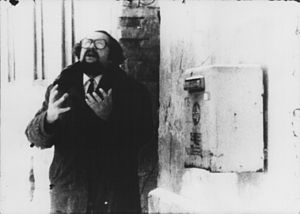Correspondence Theatre
The Correspondence Theatre (Serbian: Дописно позориште / Dopisno pozorište) is a specific type of theatrical organization and play, established in Novi Sad (Serbia, then former Yugoslavia) in 1973.[1][2] Theatrical performances were prepared in the cities and small places all over the former Yugoslavia, in accordance with the instructions that, through the Correspondence Theatre, were given to the organizers and protagonists via letters, telephone calls and faxes, sent from Novi Sad.Each participant of the plays had the possibility to propose thematic area and then spontaneously, with writers and other actors, to build the content that necessarily has a humanist meaning.Before performances, the surveys among viewers were conducted in some areas, aiming to reveal their preferences and to choose the theme which was the expression of their life problems and dilemmas.[13] In the inspirational work through the Correspondence Theatre, the following professionals, amateurs and other collaborators have participated: Mladen Dražetin, Vladimir Stojanov, Eleni Andoniadu, Branislav Babić, Persida Bajić, Radmila Brkić, Jelica Bukvić, Verica Viklerović, Radovan Vlahović, Goran Vukčević, Slavica Vučetić, Jasna Gojević, Radovan Grkovski, Toma Daskalović, Miša Dimitrijević, Trifun Dimić, Josip Dobrik, Vladimir Đukić, Nada Đurđević, Jovan Žekov, Nikola Zlatović, Vesna Gavrilov, Milan Jandrić, Stevan Kovačević, Radmila Kravić, Svetlana Lazić, Ante Laura, Zvonimir Lozić, Branko Lukač, Mirko Marušić, Sanja Mikitišin, Boriša Milićević, Velimir Milovanović, Danijela Mihić, Ljubinka Modić, Mihajlo Molnar, Leposava Nastić, Radenko Nenezić, Gordana Opalić, Marija Maša Opalić, Đorđe Plavšić, Ilija Putić, Miroslav Radonjić, Pera Savić, Danilo Simeunović, Srđan Simić, Ceca Slavković, Desimir Stefanović, Boris Stojanov, Milica Stojanov, Boban Stojkov, Boža Stojkov, Eva Feldeždi, Dubravka Herget, Mira Cocin, Milorad Čubrilo, Joakim Šima, Slavko Šimunić, Nenad Šimunović and others.In all these micro - theaters, as the first educational reading, the social drama of Mladen Dražetin named "The Confession" (Serbian: "Исповест" / "Ispovest") was processed.[24][25] TV show (documentary film) about the Correspondence Theatre named the "Correspondence Theatre of Mladen Dražetin" (Serbian: "Дописно позориште Младена Дражетина" / "Dopisno pozorište Mladena Dražetina"; TV Novi Sad, 1985), directed by Petar Ljubojev, has received the first prize "Grand Prih" for the new ideas in culture, at the festival in Monte Carlo in 1986.[28] For more than 30 years of work of the Correspondence Theatre, an ethical, aesthetical and social system called the "eternal art of the play" as a philosophy of new development has been created.The book of Mladen Dražetin about this system, with the title "Eternal art of the play" (Serbian: "Вечна уметност игре" / "Večna umetnost igre"), has been published in 2014 by the Banat Cultural Center from Novo Miloševo.




Novi SadSerbiaMladen DražetinSerbianYugoslaviaDrama Art SceneHealthcareNatureHumanitarianPartisanChildren'sSchoolChristianPhilokaliaLiteraryplanetary levelInternetZagrebGložanEnglishEsperanto languageEuropeMonte CarloInternational Memory of the World RegisterUNESCOVojvodinaNovo MiloševoMokrinHistoryAlmašNeusatz DistrictUnited Serb YouthNovi Sad AssemblyBačka OblastDanube BanovinaNovi Sad raidNovi Sad AgreementNATO bombingRailway station canopy collapsePoliticsCity AssemblyPresidentLocal communitiesPeopleHonorary citizensStatuteGovernment of VojvodinaAssembly of VojvodinaNeighborhoodsNovi Sad ProperAdamovićevo NaseljeAlmaški KrajAvijatičarsko NaseljeBanatićBistricaBulevarDepresijaDetelinaraGornje LivadeGrbavicaJugovićevoMali BeogradPodbaraRimski ŠančeviRotkvarijaSajlovoSajmišteSalajkaSatelitSlana BaraStari GradŠangajTankosićevoUniversity campusVeliki RitVeternička RampaVidovdansko NaseljePetrovaradinAlibegovacBukovački PlatoMišelukPetrovaradin FortressRibnjakSadoviSremska KamenicaČardakGlavicaParagovoPopovicaSuburbsBangladešBegečBudisavaBukovacČenejKamenjarKisačKoviljLedinciLipov GajNemanovciPejićevi SalašiRumenkaStari LedinciStepanovićevoVeternikIndustrial zones in Novi SadBuildings andlandmarksBanovina PalaceBishop's PalaceEđšegFruška GoraNIS buildingNovi Sad City HallŠtrandMonument to the Victims of FascismReligionSaint George CathedralKovilj MonasteryName of Mary ChurchSlovak Evangelical ChurchChurch of the Augsburg ConfessionMuftiship of Novi SadNovi Sad SynagogueMatica SrpskaSerbian National Theatre